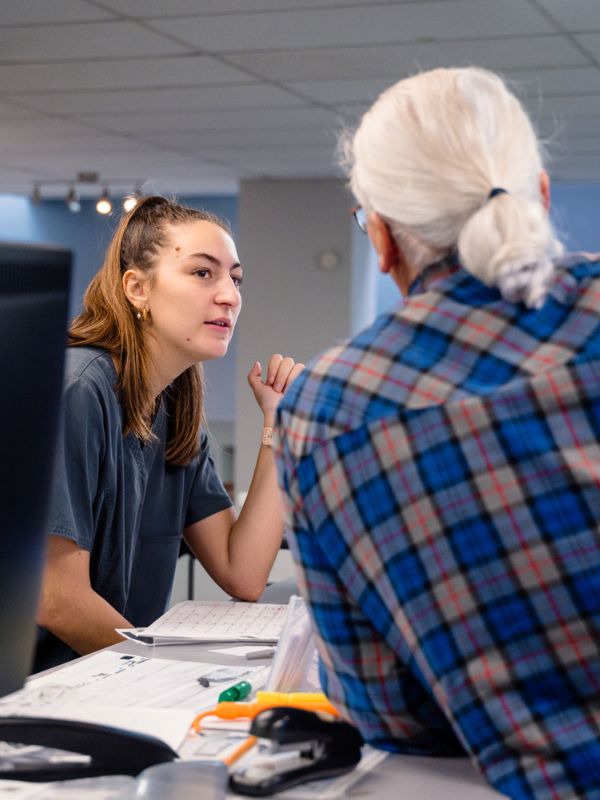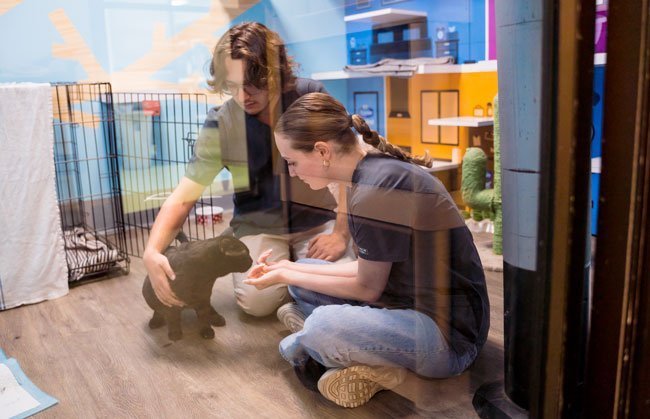A new approach: open adoption
Families looking to adopt a shelter animal now often start with a search online. They pour over detailed animal profiles describing characteristics and setting specific adoption criteria. Families then get in touch or come to the shelter to meet the animal with whom they have “fallen in love” with virtually.
This approach is still commonplace in many shelters and it certainly has its advantages. However, many North American shelters have successfully implemented new practices, and the Montreal SPCA is looking to gradually follow suit. This is why you will no longer find specific criteria in the adoption files on our website, for instance.
Strict adoption criteria are slowly giving way to the open adoption approach.
Open adoption encourages families to come directly in to the shelter to talk with our adoption counsellors in person.

It allows us to have open, non-judgmental conversations with potential adopters and share information: We show families how to meet a specific animal’s needs, and they tell us about themselves and their experience with animals.
The approach fosters conversation and builds trust, instead of insisting on strict and restrictive search criteria, such as “fenced yard required” or “no children or other dogs allowed.” After all, the process of adopting a living being should not be like shopping online for a TV or a sofa!
With open discussion, families may even find that a species other than the one they had originally imagined would be better suited to their lifestyle. For example, someone might decide to adopt a turtle instead of a dog. Yes, we have seen it happen!
Coming in to the shelter is also a great way for families to meet animals who are not yet featured on our website!
Thank you for choosing adoption!

FAQ
What are the five keys to successful adoption?
The family and animal are a good match.
The animal receives appropriate veterinary care.
The animal’s social, behavioural and companionship needs are met.
The animal’s living environment (food, water, shelter, etc.) is adequate.
The animal is respected and valued.¹
Can I call you for more information about an animal I am interested in adopting?
Unfortunately, no. Our adoption counsellors work hard to serve families on–site. If they were to manage returning your call or your email, the animal you’re interested in might be being adopted by another family on-site as you chat! The best and easiest way to find out more about our residents is to come in to the shelter.
Aren’t you worried people will adopt on impulse if you recommend coming in to the shelter without a specific animal in mind?
It may come as a surprise, but studies show that spontaneity is not a determining factor in making an adoption successful. Adopting an animal is a huge responsibility. Some people need a great deal of preparation, while others jump into the adventure more spontaneously. Careful planning can sometimes lead to high expectations and, if these expectations are not met, disappointment and frustration can follow. Some people need to plan long and hard for an adoption, while others do not.
Do you let just anyone adopt any animal?
No. Our adoption process is rigorous, and our adoption counsellors strive for the best possible match between our protégés and the families who come in to the shelter.
What’s more, when potential adopters talk with our adoption counsellors, they may realize they don’t have everything it takes to make the adoption a success. We can then help them put the missing pieces in place so they can come back to us when they’re ready.
I don’t care for this new process. What do you suggest?
Many of the Montreal SPCA’s protégés live in temporary foster homes, not at our shelter. We will maintain our former adoption process for these animals. You can fill out a form to express your interest and we will contact selected families on a first-come, first-served basis according to the animal’s needs. We’ll hold a telephone interview and set up an appointment for you to meet the animal.
You can also use the Petfinder website or app or look online to find shelters in your area. The important thing is to find a local shelter you can trust and offer an animal in need a second chance, rather than encourage breeding.
Sources / To learn more




